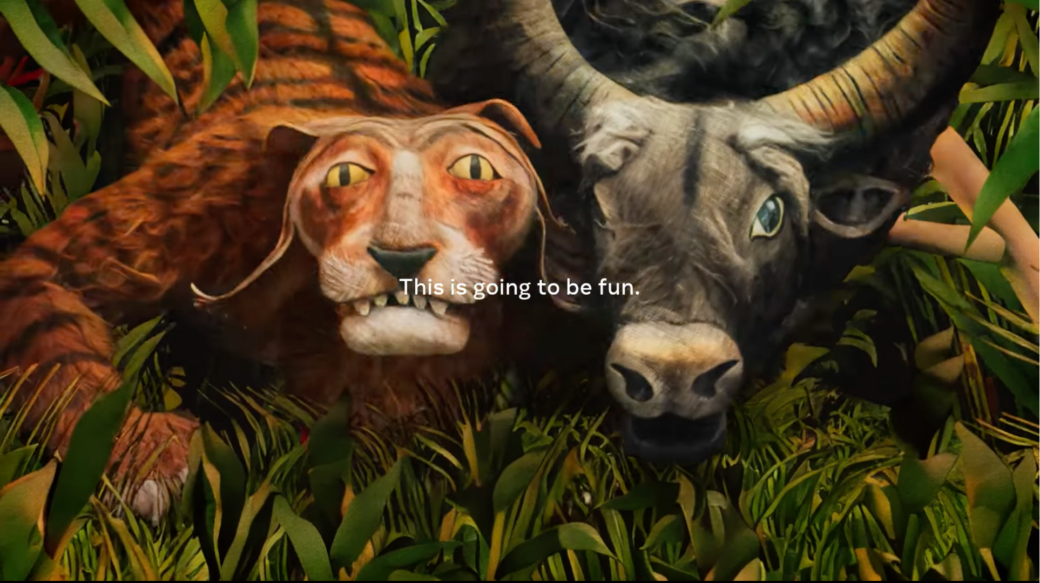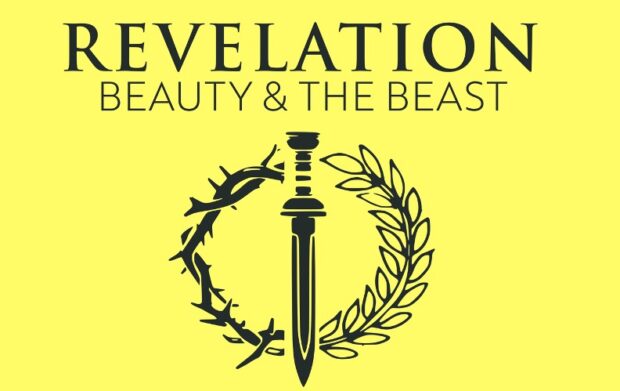This is an amended version of a sermon I preached at City South Presbyterian Church in 2021. If you’d prefer to listen to this (Spotify link), or watch it on a video, you can do that. It runs for 38 minutes.
If you were brought before someone and asked to stand for Jesus or die, would you do it?
That is the situation facing the earliest readers of this letter. Remember, it becomes official Roman policy to execute anyone who refuses to worship Caesar; to fall before him. This is how Pliny describes his procedure to the Emperor Trajan:
“I interrogated them as to whether they were Christians; those who confessed I interrogated a second and a third time, threatening them with punishment; those who persisted I ordered executed.”
Would you stand for Jesus if you were confronted by the beastly power of Rome? What about in the beastly empires from Daniel?
Over the last few weeks, we have seen this theme of beastliness at work in any empire and kingdoms opposed to God’s rule.
Do you think you could stand for God in the pressure cooker of these empires? Like beastly Neduchadnezzar, who commanded worship of his image with the threat of fire (Daniel 3:5-6).
Or beastly Darius the Mede, with the threat of lions or beasts; the famous Daniel in the lions’ den story (Daniel 6:7).
Would you worship the empire, or worship God?
I know what we like to think. We would like to think we would stand.
But what about when that command is coupled with the bright lights and the big city?
The ‘heaven on earth’ offered in the gardens of Babylon? Or the peace of Rome?
The food, the parties, the feasting of the senses, the sex, the promises on offer if you leave the safety of your family home and set out on a big adventure into the city to discover your true self?
The bright lights of our own garden city, and its (food) courts [note: this is clever because our local Westfield was, until recently, named Garden City], and its promise of fulfillment if we buy and sell and work and participate in an economy that is seeking heaven on earth.
Temples were little ‘heavens on earth’ wherever you went, and we still have temples. Garden cities offering a vision of heaven to us if we will just buy into a system of worship.
And now we can do this online too.
The theologian William Cavanaugh wrote a book called Being Consumed, it is great, and so is this article about Amazon as an idolatrous empire. He talks about the way Amazon dehumanizes people, it commodifies by disguising the human involvement in our purchases. We just see the thing, and its price, and have no idea who made the thing, delivered the thing, or even packed it in the warehouse, and we do not care.
Amazon does not even have warehouses; it has fulfillment centers. An interesting choice of words.
Garden city. Fulfillment centers. These are little attempts to build heavens.
But, workers in those centers, like other real workers behind our digital heavens, like the people who decide what images are too much for us to see, these workers are invisible. And Amazon wants its human workers to act like machines. They have even patented an electronic wristband that will monitor efficiency, setting timed goals for them to go through the motions; like machines; like animals. Inhuman.
To serve those in the kingdom, who are the haves, the buyers, the consumers. These workers are probably enmeshed in the system too, using their pay to buy more stuff from Amazon.
It is like the story of the prodigal son and the way he is drawn by the bright lights but ends up living with the pigs and eating their food.
And this is all to fund Jeff Bezos’ dream to create a heavenly future, away from the earth, where we all live in utopian communities on spaceships built and serviced by Amazon. And then there is the idea of digital paradise that is becoming more and more real, especially this week with Facebook’s launching of its little digital heaven. The metaverse.
I do not know if you saw the promos, but the idea is we can escape and be our true selves in these paradise-like virtual environments, and maybe one day we will be able to digitize our brains and live forever in a computer.
And this sort of utopia is a vision perpetuated by every technology ad that tells the story that we can build heaven either on earth or escape to a virtual heaven. One of Facebook’s Meta promos even has a predator lying down with prey, or a weird two-headed beast from Revelation; you decide.

Either way, it is apocalyptic imagery. But as we will see today, this is also because fake kingdoms like Fakebook present fake heavens as part of their appeal. When a beastly empire comes knocking, it is not just with the threat of the sword, but these false heavens, with their beautiful beastly cities and their false messiahs.
Will you stand? No matter the cost, no matter what it means missing out on?
Will you be a faithful witness?
Like these two witnesses, who stand and speak for God, prophecy, dressed in sackcloth, dressed for mourning, not glory.
The Greek word for witness here is martyr (Revelation 12:3). Two martyrs.
John calls them two olive trees (Revelation 11:4). Two lampstands standing before the Lord. Now, there is rich Old Testament background both for olive trees and lampstands, but John has already pointed his lens at some lampstands to tell us who they are.
Remember, this is a letter to seven churches (Revelation 1:4). And in the opening of the letter, there are seven lampstands (Revelation 1:12-13). John tells us they are the seven churches (Revelation 1:20). And, when Jesus addresses these seven churches, he says the ones who do not hear and respond, instead of blessing, they will receive curse. Their lampstands will be removed from God’s presence; they will be exiled (Revelation 2:5). Jesus, through John, calls five churches to repent (Revelation 2:5, 16, 22, 3:3, 19), while he tells two churches to keep holding on, keep being faithful, while beastly forces push against them (Revelation 2:10, 3:11).
Revelation is asking that same question we are asking ourselves today. Will you stand in the pressure cooker of the big city, the false heaven, the beasts surrounding you. Will you speak for God? Now John points the camera at two faithful churches living in the bright lights and big cities of the beastly kingdom of Satan, with all their false heavenly allure and power.
Where these faithful witnesses give their testimony. Prophecying about Jesus.
And when they finish, the beast roars out of the abyss and kills them (Revelation 11:7).
And you have heard about Christianity in the public square. This is what it looks like when truth is made public; not worldly power, but crucifixion (Revelation 11:8).
This is part of our testimony in the public square, martyrdom, being killed, just like Jesus, not living or politicking like the kingdoms of this world, but like Jesus. John sees this in the great city, figuratively called Sodom and Egypt, cities in the Old Testament, that were enemies of God and his kingdom, and experienced his judgment, fire from heaven, plagues, the Passover (Revelation 11:8).
Only this time, the great city is where Jesus was crucified. Here John is identifying Jerusalem, because of its rejection of the Messiah, and the judgment that brought, with the beastly cities of the world. He will go on to talk about the great city of Rome, the new Babylon, and so he is painting Jerusalem as just like these cities, as being in bed with beastly powers. Which is what we see in John’s account of the crucifixion.
It is interesting to read this through the Revelation lens.
Jesus, on trial, declares his kingdom is not of this world (John 18:36). It is not like the beastly kingdoms of the world, because, if it was, his people would have taken up swords to prevent his arrest by the Jewish leaders. There is an implication that they are of the beastly system here. Jesus’ kingdom comes from elsewhere.
And then the Jewish leaders are the ones who drive the crucifixion even when Rome’s political authority, Pilate, is looking for a way out (John 19:7).
They want Jesus killed because he claims to be the Son of God, and they cannot lose their hold on power or influence, their place in the big city of the world.
Still, Pilate wants to set Jesus free, but the Jewish leaders keep shouting, and they appeal to beastly human power (John 19:12). If you let him go, you are no friend of Caesar. “Anyone who claims to be a king opposes Caesar.”
When crunch time came, these leaders of God’s people did not stand and worship God.
They did not prophecy about the Messiah.
They proclaimed Caesar as king (John 19:15-16). It is clear which empire they belong to, which king they serve. What God they worship.
These leaders chose to stand with Caesar. To be friends with Caesar; friends with the world; friends with Satan.
And so, those who stand with Jesus can expect to be treated like our king.
The bodies of these witnesses become a spectacle in the midst of a celebration, a fake heavenly party. There is the giving of gifts (Revelation 11:8).
There are people from every tribe, language, and nation, coming together in a celebration of beastliness; the kingdom of the earth and its vision of heaven. Babylonian heaven. Roman heaven. Beastly heaven.
Instead of gathering around the slain lamb like in Revelation 7:9, these inhabitants of the beast’s kingdom gather round his prey, slain Christians, and celebrate in a beastly parody of heaven; a scene we will see repeat in chapter 13.
The city of God, the city of peace, Jerusalem, has become the city of Satan, and death. It needs renewal.
And indeed, John pictures that renewal coming. The journey to the new Jerusalem begins with the resurrection and recreation of God’s faithful people secured by his victory and the day of the Lord. Salvation and judgment.
The faithful witnesses do not stay dead. They are vindicated (Revelation 11:11-12).
They are re-created by the breath of life from God. They stand up again. They are glorified in the face of their enemies, and in John’s vision, there is an announcement.
The kingdom of the world has been replaced by the kingdom not of this world (Revelation 11:15).
But when does this happen?
Is this a future point about some future church, the church in the last days, or is it a picture of reality for every faithful church living in the world marked by Jesus’ victory and awaiting his return?
That is the million-dollar question, and yet, I think Revelation has already answered it in its picture of God and the slain lamb ruling from the throne, and the glorious Son of Man having entered the heavenly courts as king. It has become this.
John wants faithful churches who hang on to Jesus and anticipate life in his city, in the new Jerusalem, to know that this future is already secure, that we are already raised with Jesus and seated with him in the heavenly realm. That Jesus already reigns as king (Revelation 11:17). That judgment has already fallen on Jerusalem, that it did at the cross, and in the way the temple curtain was torn, and in the way the day of the Lord came when God’s glorious presence was poured out on people through the Holy Spirit arriving to unite us to Jesus and raise us with him, and in the way it also came for the Gentiles, because Jesus is now king of kings and Lord of Lords. Jesus is both Lord and King and Judge, and faithful witnesses secure rewards, while those who oppose God face judgment. Destruction. Not simply for persecuting God’s people but even for the beastly way of life that destroys the earth (Revelation 11:18).
Now, John turns the camera on these beastly kingdoms.
We meet these new characters, and it is a little cosmic retelling of the story of the Bible, centered on the birth of a chosen king and the defeat of Satan.
It is a Christmas story like you have never heard it before. Make sure you have got a dragon in your nativity scene this year. Because we meet this pregnant woman with 12 stars on her head, and when you see the number 12, think Israel pictured as God’s glorious people, a bride even, clothed with the sun (Revelation 12:1).
This is a picture of Israel, pregnant, ready to deliver God’s chosen king to the world.
And she is met, in her labor, by an enormous red dragon, and when we see crowns and horns, their symbols of power and authority (Revelation 12:3).
This dragon is beastly, and like Herod when Jesus was born, or Pharaoh when Moses was born, he is ready to devour this child. That is beastly, right, the moment it is born (Revelation 12:4).
He knows what is at stake if his rule is challenged.
And Israel gives birth to a promised king who will rule all the nations as the prophets promised, and before Satan can sink his teeth in, this child finds himself in God’s throne room (Revelation 12:5).
And that seals the defeat of Satan — the ascension of this king — restoring people of every tribe, tongue, and nation, back to life with God — this ends the power and dominion of Satan (Revelation 12:9).
In John’s vision, this has happened.
The dragon has been hurled down — like lightning — the kingdom of God and his king, the Messiah, has come with salvation and power because Satan has been defeated, and all people can come home (Revelation 12:10).
And how did it happen? How was this heavenly victory won?
By the blood of the Lamb (Revelation 12:11).
Just when it looked like Satan’s minions in Rome and Jerusalem were getting together to kill Jesus and win, they lose.
And how does this victory keep being hammered home?
By the word of the testimony of the faithful people of God who are prepared to bear witness even to the point of death.
And so now, it is not party time in Jerusalem, in a false city of false gods, offering a false heaven — over the death of the faithful witnesses. Now it is party time in the heavens.
And trouble for those who might fall victim to the lure of a defeated dragon and his empty promises about power and glory.
He is on borrowed time. A dead dragon walking.
And what is the call to those of us who live here on the earth and believe that the lamb has won? That he rules on the throne? While this dragon thrashes about and wages war on God’s people — trying to devour us? Hold fast to your testimony about Jesus (Revelation 12:17).
Hold on.
Stand.
When the pressure comes — whether from the sword or the carrot — the lure of false worship, or false heavenly cities — hold on.
Be the two lampstands. The faithful church. Even to the point of death (Revelation 11:4).
Will you stand?
Because beastly empires are going to make it hard. They are going to come for you. They might even hurt you.
But you know what hurts more? Letting go.
John turns the lens on these beasties and invites us to see what is at stake here. He wants us to see the powers and principalities in this world that are not of the kingdom of heaven, but the kingdom of the world — the violent, grasping, dominion systems that dehumanize and devour — even as we worship beastly things that conform us into their image — he wants us to see them as they are, and to stand against them as we stand for Jesus.
So we see these beasts coming out in service of the dragon. First, a beast from the sea. It has ten horns and crowns — just like the dragon — a picture of power, and each head with its crown has a blasphemous name (Revelation 13:1). Each crowned head proclaims itself a false god; a false Messiah. Each invites us to be ruled by someone other than Jesus.
It is beastly — like the beasts in the Old Testament — and it is given its power, and throne, and authority, by the dragon (Revelation 13:2).
Satan gives these kingdoms power to oppose God — he backs their blasphemy.
And remember a few weeks back we looked at how Revelation might work like a lens that helps us look at the world, rather than a code that helps us to see direct links to people; the rubber hits the road on this here.
I think it is a lens that helps us see worldly kingdoms opposed to Jesus as they really are — tools of Satan — but that this lens worked for its first audience as well, and it works for us when we see how it unveiled the powers and principalities at work in the life of the first readers.
And so while I think there is reason to be suspicious about some readings of Revelation that see Rome everywhere through odd mathematical stuff and weird reconstructions around Nero’s death and fears he might return, there are plenty of direct links without having to get out a decoder ring.
Because what is it that reveals that something is beastly or satanic?
It is when people worship these powers or systems or kings instead of Jesus, because of their incredible might, “who can wage war against it” (Revelation 13:4)? Who can resist?
It is empires and systems that are blasphemous — that do not simply operate to bring order and goodness to the world, restraining evil, but that claim the place of God, even through good intentions — slandering His name, and His dwelling place, while trying to set up utopian visions of heaven and heavenly cities without God in the mix (Revelation 13:6).
It is the people who want Eden, only without the presence of God — where actually the presence of God is what makes Eden, Eden.
It is those kingdoms built around shared loves and shared visions of the good life that exclude the lamb — and so inevitably choose violence, like the kingdoms of the world, rather than sacrificial love, like the kingdom of the Lamb who was slain before the creation of the world (Revelation 13:8).
And the message of Revelation is that to choose the beast is to go into captivity — into exile — out of Eden — to not be God’s kingdom and priests — but to be destroyed by the sword (Revelation 13:10).
To be devoured by the devourer — but more than that, to be judged by the one who defeated and will judge the devourer.
And so the faithful witnesses are those who stand.
Those who endure.
Those prepared to be outcasts — humiliated — executed in the public square, in order to bear testimony to the lamb who was slain (Revelation 13:10).
That was the message to the faithful churches… remember…
Be faithful and hold on (Revelation 2:10, 3:11).
Stand.
And then there is a second beast — and this maybe is the one that is the most famous bit of Revelation. This beast from the earth that looks a bit like a lamb, but speaks like a dragon — which I think is again a picture of how much fake kings will set themselves up to mimic the real king, while being serpent-tongued (Revelation 13:11).
So, it can be hard to spot the beastliness if you are not careful.
This second beast makes everyone worship the first beast — it orders them to set up an image to be worshipped — it gives life to the image the way God gave life to people (Revelation 13:14-15).
There are all sorts of possible fits for this beasty for its first readers — lots of commentators identify the first one as Roman political power — the crowned heads with blasphemous names as the emperors — and then this second beast as the imperial cult. Other people see the first beast as Rome’s political power — secured by the sword — and the second as Rome’s economic power.In either case, the idea is that you cannot buy or sell or participate in the heaven-like city of the kingdom without worshipping the king, and John is exposing this heavenly vision for what it is; beastly.
And inviting us to carry the name of the beast, as worshippers, or the name of the lamb, as the people of God who worship him.
Rome is definitely defining the experience of the first readers — but I think we make it too much of a code, and not enough ‘lens’ if we think it is all about Caesar and laws around who can buy and sell in the marketplace using coins with his head on them…
That is a type of beastliness, but it is the political manifestation of a bigger spiritual reality that we will get while the dragon thrashes about.
I think there is a sense that all those forms of power were so deeply embedded, that is the point — but there is also some cosmic stuff going on with these two beasts — they are a bit like the sea and land beasts — Leviathan and Behemoth we see in Job (Job 40:15, 41:1); pictures of the cosmic powers and principalities that we cannot reign in, but that only God can; pictures of the intersection between the spiritual world, idolatry, and the political systems that all creates.
In Job, these big strong beastly powers could only be controlled — defeated — by God himself; its strength was beyond us, and yet puny for God (Job 40:19).
In Jewish thought — and these beasties get quite a bit of airtime in Jewish religious writings outside the Bible — these two beasts were symbolic of the powers of evil, and God was going to destroy them in the final judgment, and this is also part of Isaiah’s vision of the day of the Lord.
God bringing his sword against Leviathan, the gliding serpent monster of the sea — the chaos beasty (Isaiah 27:1).
There is even a belief in the Jewish religious texts that these beasts will be what gets eaten at the feast of celebration that happens; God’s big banquet; his celebration of the undoing of beastliness at the wedding supper of the lamb.
So it might be better not to think of the beasts as Rome, and its emperors, but that John is trying to help us see how Rome and its empire, with all its false worship, is just another in a long line of political regimes animated by this sort of serpentine, beastly, force, and to see these forces all being brought to heel by God through his victorious king.
So what happens when we look at the world through this lens?
When beastly empires want to throw Christians to the lions? Or the fire.
Or kill anyone who will not join their worship?
Where do these forces work for us?
I think they are at work in any political, social, or economic situation — any city or agenda — that offers a false vision of heaven, with false messiahs — false kings, or saviors, with promises that we can take part in that economy if we just worship that way, if we just give ourselves.
It is in the metaverse, or the eschatological vision of Jeff Bezos and others who think we can build heavenly cities — here, and in space, using human ingenuity…
It is the bright lights of the garden city — the promises of advertisers and corporations that they are the path to your happiness if you just consume; devour; destroy the earth —
The new idolatry that invites us to experience satisfaction — build our own little heavens — at the click of a button.
Seeking fulfillment while dehumanizing the people on the other end of the mouse click — turning them into beasts, or robot-like drones who service our desires.
It is the invitation to end up being beastly, dining with the pigs — rather than glorious, dining with the lamb.
It is in the political forces at work in our world — not just in countries where owning the name of Jesus leads to death, but where being faithful leads to ridicule or persecution in the public square; the pressure to conform to the world’s view of sex, or money, or power, or progress, or growth, or politics, to chase Leviathan, and become beastly.
If we can avoid letting go of Jesus to grab these beastly regimes, then we might become faithful witnesses.
We might become martyrs; those who testify to the crucified king as those living in their false heavens pursuing a false Eden — a garden city — without the gardener king mock us, and perhaps persecute us.
If the persecution is not happening — then that is something to be thankful for, but maybe we should also ask if it is not happening because we are not being faithful? If it is not happening because we are being lukewarm?










